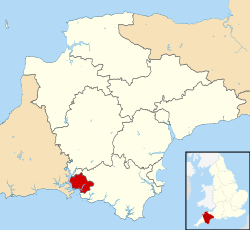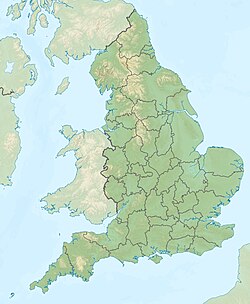
Back Plymouth AF Plymouth ALS Plymouth AN Sūþtun on Defnum ANG بليموث Arabic بليموث ARZ Plymouth AST Plimut AZ Плімут BE Плімут BE-X-OLD
Plymouth | |
|---|---|
 Clockwise from top: West Hoe, Smeaton's Tower, University of Plymouth, Royal William Yard, National Marine Aquarium, Southside St, Barbican | |
| Nickname: Britain's Ocean City | |
| Motto(s): | |
 Shown within Devon | |
| Coordinates: 50°22′17″N 4°08′32″W / 50.37139°N 4.14222°W | |
| Sovereign state | United Kingdom |
| Country | England |
| Region | South West England |
| Ceremonial county | Devon |
| City status | 1928 |
| Unitary Authority | 1998 |
| Government | |
| • Type | Unitary authority |
| • Body | Plymouth City Council |
| • Leadership | Leader and cabinet |
| • Council control | Labour (as of 04 July 2023) |
| • Members of Parliament | Johnny Mercer (C) Luke Pollard (L) Gary Streeter (C) |
| Area | |
| • Total | 30.83 sq mi (79.85 km2) |
| • Rank | 215th (of 296) |
| Highest elevation | 509 ft (155 m) |
| Lowest elevation | 0 ft (0 m) |
| Population (2021) | |
| • Total | 264,726 (city / unitary authority) 294,139 (urban) |
| • Rank | 65th (of 296) |
| • Demonyms | Plymothian (formal) Janner (informal) |
| Time zone | UTC0 (GMT) |
| • Summer (DST) | UTC+1 (BST) |
| Postcode district | |
| Area code | 01752 |
| Police | Devon and Cornwall |
| Ambulance | South Western |
| Fire | Devon and Somerset |
| Website | plymouth |
Plymouth (/ˈplɪməθ/ ⓘ PLI-məth) is a port city and unitary authority in Devon, South West England. It is located on Devon's south coast between the rivers Plym and Tamar, about 36 miles (58 km) southwest of Exeter and 193 miles (311 km) southwest of London.
Plymouth's history extends back to the Bronze Age, evolving from a trading post at Mount Batten into the thriving market town of Sutton, which was formally re-named as Plymouth in 1439 when it was made a borough. The settlement has played a significant role in English history, notably in 1588 when an English fleet based here defeated the Spanish Armada, and in 1620 as the departure point for the Pilgrim Fathers to the New World. During the English Civil War, the town was held by the Parliamentarians and was besieged between 1642 and 1646. In 1690 a dockyard was established on the River Tamar for the Royal Navy and Plymouth grew as a commercial shipping port throughout the Industrial Revolution.
After absorbing nearby settlements in 1914, the borough was awarded city status in 1928. During World War II, Plymouth suffered extensive damage in the Plymouth Blitz, leading to post-war rebuilding that significantly shaped its modern appearance. A further expansion of its boundaries in 1967 contributed to its current status as the 30th-most populous built-up area in the UK and the second-largest city in the South West after Bristol, with a population in 2021 of 264,727.
Plymouth's economy, historically rooted in shipbuilding and seafaring, has transitioned towards a service-based economy since the 1990s. It maintains strong maritime connections, hosting HMNB Devonport, the largest operational naval base in Western Europe, and offering ferry links to Brittany and Spain. The city is also home to the University of Plymouth, reflecting its educational and cultural significance. Today, the city is governed locally by Plymouth City Council and is represented nationally by two Members of Parliament.
- ^ Cite error: The named reference
brief historywas invoked but never defined (see the help page). - ^ "Mid-Year Population Estimates, UK, June 2021". Office for National Statistics. 21 December 2022. Retrieved 18 October 2023.




